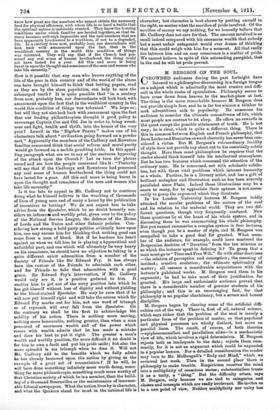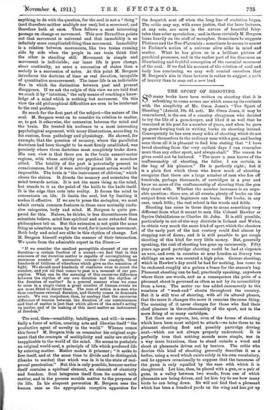M. BERGSON ON THE SOUL.
CROWDED audiences during the past fortnight have listened to a philosopher discoursing in a foreign tongue on a subject which is admittedly the most evasive and diffi- cult in the whole realm of speculation. Philosophy seems to have come down from heaven to the market-place at last.
The thing is the more remarkable because M. Bergson does not provide simple fare, and he is far too sincere a thinker to seek adventitious aids to popularity. He summons his audience to consider the ultimate conundrums of life, which most people are content to let sleep. He offers no rewards in the quest except the possible attainment of truth. He is not easy; he is clear, which is quite a different thing. There is this in common between English and French philosophy, that from Locke and Descartes onward obscurity has never been con- sidered a virtue. But M. Bergson's extraordinary lucidity of style does not provide any short cut to his essentially subtle thought. More than most philosophers he requires that the reader should think himself into his intellectual atmosphere. But he has two features which command the attention of the ordinary man. He is concerned, not with scholastic subtle- ties, but with those vital problems which interest humanity as a whole. Further, he is a literary artist, and has a gift of brilliant metaphor and illustration such as has been scarcely paralleled since Plato. Indeed these illustrations may be a snare to many, for to appreciate their aptness is not neces- sarily to grasp the argument which they illustrate.
In his London University lectures M. Bergson boldly attacked the secular problems of the nature of the soul and its relation to the material world. They are two dif- ferent questions, though very frequently confused. Now these questions lie at the heart of his whole system, and in discussing them he was summarizing his whole philosophy. But you cannot summarize a complex system in four lectures, even though you be a master of style, and M. Bergson was compelled to take a good deal for granted. What mem- ber of the audience, for example, could have mastered the Bergsonian doctrine of "Duration" from the ten minutes or so which the lecturer spent in defining it ? To grasp that a man must go to " Time and Free Will." So with other doctrine's —the relation of perception and conception ; the meaning of instinct ; creative evolution; the ultimate spirituality of matter ; all assume a considerable acquaintance with the lecturer's published works. M. Bergson used them in his argument; he had to take most of their justification for granted. His large and enthusiastic audience proved that there is a considerable number of genuine students of his philosophy ; and this is an encouraging fact, for that philosophy is no popular charlatanry, but a severe and honest discipline.
M. Bergson began by clearing some of the artificial diffi- culties out of the way. There is, first of all, natural science, which says either that the problem of the soul is merely a particular form of the problem of matter, or that psychical and physical processes are wholly distinct, but move on parallel lines. The result, of course, of both theories —epiphenomenslism and parallelism alike—is a mechanistic view of life, which involves a rigid determinism. M. Bergson rejects both as inadequate to the data ; rejects them sum- marily, for it is not an argument which could be expanded in a popular lecture. For a detailed consideration the reader may turn to Mr. McDougall's " Body and Mind," which we reviewed last week. Then in the second place there is philosophy to make trouble. Empiricism resolves the mind into a multiplicity of conscious states ; substantialism treats it as a unity, a "thing." But the difficulty arises, says M. Bergson, only because we are tied to categories and classes and concepts which are really irrelevant. He invites us to a new point of view. Neither multiplioity nor unity has anything to do with the question, for the soul is not a " thing " (and therefore neither multiple nor one), but a movement, and
therefore both at once. Then follows a most interesting passage on change or movement. This new Heraclitus points out that movement is universal and that immobility is an infinitely more complicated thing than movement. Immobility is a relation between movements, like two trains running side by side when the people in one train think that the other is standing still. Movement is simple and movement is indivisible ; our inner life is pure change, sheer continuity, no more a succession of states than a melody is a succession of notes. At this point M. Bergson introduces the doctrine of time as real duration, incapable of quantitative measurement. The inner life is an indivisible flux in which the distinction between past and present disappears. If we ask the origin of this view we are told that we reach it by " intuition," the only means of reaching a know- ledge of a mind which is nothing but movement. On this view the old philosophical difficulties are seen to be irrelevant to the real problem.
So much for the first part of the subject—the nature of the soul. M. Bergson went on to consider its relation to matter, or, to put it otherwise, the connexion between the mind and the brain. He treated his audience to a most interesting psychological argument, with many illustrations, according to his custom, from pathology and physiology. He showed, for example, that the question of memory, where the parallelist doctrines had been thought to be most firmly established, was precisely where these doctrines most completely broke down.
His own view is that there are in the brain sensori-motor regions, with whose activity our psychical life is somehow allied. The totality of the past is potentially present to consciousness, but if it were actively present action would be impossible. The brain is "the instrument of oblivion," which closes the sluices. It directs the memory and orientates the mind towards action. It is not the same thing as the mind, but stands to it as the point of the knife to the knife itself. It is the edge that cute into reality. It forces the mind to concentrate on life. It limits the soul, but by limiting it makes it effective. If we are to press the metaphor, we must admit certain common features in those once mutually exclu- sive categories, body and mind. M. Bergson is quite pre- pared for this. Nature, he thinks, is less discontinuous than scientists believe, mind less spiritual and more extended than philosophers tell us. But this extension is not quite the same
thing as scientists mean by the word, for it involves movement. Both body and mind are alike in this rhythm of change. Let M. Bergson himself explain the manner of their interaction. We quote from the admirable report in the Times :— "If we consider the smallest perceptible element of our own duration—a certain fraction of a second—we find that in this minitnum of our duration matter is capable of accomplishing an enormous number of successive events—for example, those hundreds of trillions of vibrations which give us the sensation of light. We should need hundreds of centuries even to count the number, and yet all that comes to pass is a moment of our per- ception. What can be the meaning of this enormous difference between the rhythm of our own duration and the rhythm of the duration of matter? In a general manner when we come to seize in a single vision a great number of human events we are more fitted to direct them. The man of action is a man who thus condenses external duration, and thereby comes to dominate events. We can conjecture, then, by analogy that the enormous difference of tension between the duration of our consciousness and that of matter is just that which allows of the mind's acting on matter, and of its making of this inert matter an instrument of freedom."
The soul, then—sensibility, intelligence, and will—is essen- tially a force of action, creating acts and likewise itself " the productive agent of novelty in the world." Whence comes
this force P M. Bergson bids us remember his original argu- ment that the concepts of multiplicity and unity are strictly inapplicable to the world of the mind. He seems to postulate an original world-soul, a principle of life which produced life by entering matter. Matter makes it prisoner ; " it seeks to free itself, and at the same time to divide and to distinguish (thanks to matter) that which was in it in the state of reci- procal penetration." But this is only possible, because matter itself contains a spiritual element, an element of elasticity and freedom. Soul integrates itself from its contact with matter, and in the process moulds matter to the purposes of its life. In his eloquent peroration M. Bergson sees the human race as the appropriate receptive apparatus for
the despatch sent of when the long line of evolution began. The critic may say, with some justice, that the later lectures, at any rate, are more in the nature of beautiful fairy- tales than sober speculation ; and in them certainly M. Bergson leans heavily on the staff of metaphor. Sometimes he suggests Plotinus and the Neo-Platonists ; sometimes he seems to assent to Fechner's notion of a universe alive alike in mind and matter. What he has given us is a brilliant picture of psychical processes, and in the earlier part of his discourse an illuminating and fruitful conception of the essential movement of the soul. If we find his account of the relation of soul and body less convincing, we may well remind ourselves that M. Bergson's aim in these lectures is rather to suggest a path of inquiry than to map out a new land.







































































 Previous page
Previous page